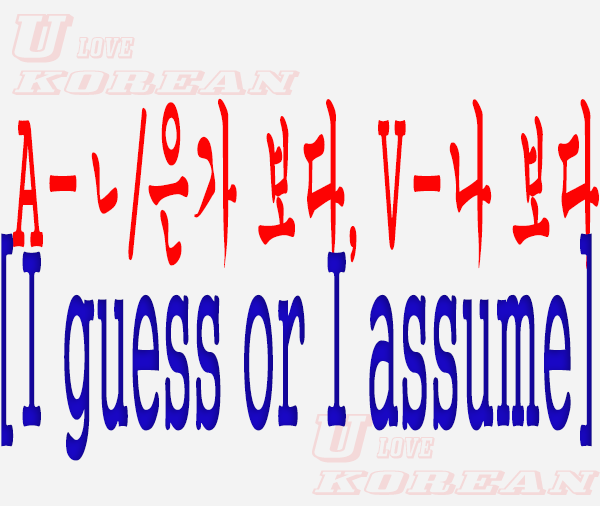Featured Posts
 ㄴ/은/는 대신에
ㄴ/은/는 대신에
- ㄴ/은/는 대신에 indicates an one action that can be replaced or compensated by one another action.
- It is mean "instead of, compensate for'
17.09.2023 | KOREAN SKILL | 0 Comments
 A-ㄴ/은가 보다, V-나 보다
A-ㄴ/은가 보다, V-나 보다
- An expression used to guess about a fact mentioned in the preceding statement.
- Both 나 보다 and (으)ㄴ가 보다 mean "I guess" or "I assume" or "I must be"
- A-ㄴ/은가 보다, V-나 보다 grammar can be replaced by A-(으)ㄴ 것 같다, V-는 것 같다
17.09.2023 | KOREAN SKILL | 0 Comments
 - 가든요
- 가든요
- "거든요" is given a reason or fact something that listener didn't know reason or fact for answer.
- It is used to provide background information before you did something or you didn't do something.
- It is meaning "because"
23.09.2023 | KOREAN SKILL | 0 Comments
 A/V/N(이)기도 하다
A/V/N(이)기도 하다
1. meaning of ~기도 하다 seems to be sometime....too.
2. A/V기도 하다 is used to indicate Verb sometime happen.
3. A/V기도 하다 offers other possibilities action or description, in addition to what is mentioned or suggested in the preceding context.
4. N(이)기도 하다 is used to multiple actions or states happen at the same time.
26.09.2023 | KOREAN SKILL | 0 Comments
 -처럼
-처럼
1. '처럼' used to indicate that it's similar in share or degree to each other.
- It's mean 'like', 'same', 'as....as'
Ex. 오늘은 날씨가 봄처럼 따뜻해요 Today's weather is as warm as spring
23.09.2023 | KOREAN SKILL | 0 Comments
 - 겠~
- 겠~
* '겠' attaches after an adjectiv / a verb stem.
1. This Grammar use to expressing the speaker plan to do or will to do action.
- It is mean that "I will", "I intend to"
Ex. 일을 열심히 하겠습니다. I will work hard.
23.09.2023 | KOREAN SKILL | 0 Comments
 V-을 뻔하다/ㄹ 뻔하다
V-을 뻔하다/ㄹ 뻔하다
1.'-(으)ㄹ 뻔하다' attaches after a verb stem.
2. This expression is used to indicate that something almost happened, but finally, this action did not happen.
3.It means "almost" or "nearly"
07.10.2023 | KOREAN SKILL | 0 Comments
 N 동안/ V-는 동안
N 동안/ V-는 동안
1. It expresses the length of time starting when a certain action begins and lasting until it ends.
2. It corresponds to ‘whil or during or for’ in English.
1. 음악을 듣는 동안 오빠는 컴퓨터를 해요.
- While listening to music, my brother plays the computer.
07.10.2023 | KOREAN SKILL | 0 Comments
 V-은 지/ ㄴ 지
V-은 지/ ㄴ 지
1. It indicates how much time has passed since some situation or action occurred and thus corresponds to 'since' in English.
2. It can be expressed in various ways, including -(으)ㄴ 지 ~되다, -(으)ㄴ 지 넘다, -(으)ㄴ 지 안 되다, , -(으)ㄴ 지 지나다.
1. 친구와 이야기한 지 30분 지났어요.
- It's been more than 30minutes since I have been talking with my friend.
2. 저는 한국어를 배운 지 6개월이 됐어요.
07.10.2023 | KOREAN SKILL | 0 Comments
 06월 10일 중고 거래 일기
06월 10일 중고 거래 일기
안녕하세요! 오늘 일기는 내용을 써야 할지 잘 모르겠습니다. 평소와 똑같이 행동하는 것 같습니다. 특별한 일이 없고 아침 8시에 회사에 출근하고 커피도 한 잔 마셨습니다. 8시 반에 근무를 시작하고 업무를 확인했습니다. 어제 반영된 업무에 대해서는 아직 피드백을 받지 못했습니다. 그래서 오늘 아침에 일이 줄었습니다. 그래서 운영계에서 더 확인하다가 일부 이슈를 찾아서 개발계에서 수정해 보고 다시 반영했습니다.
28.09.2025 | KOREAN SKILL | 0 Comments
 ㄴ/은/는 대신에
ㄴ/은/는 대신에